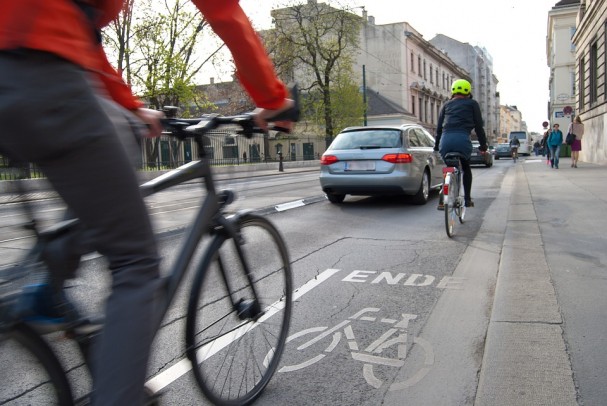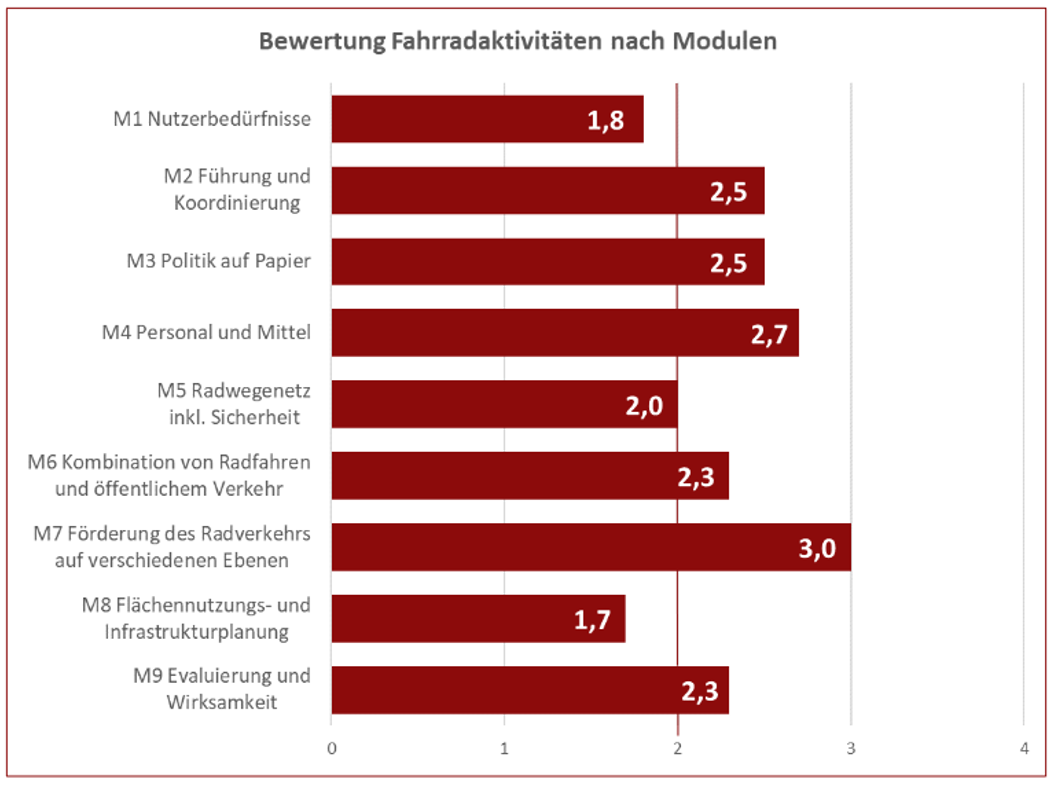First Bicycle Policy Audit for Austria completed

The purpose of a Bicycle Policy Audit (BYPAD) is to evaluate the realm of cycling in terms of politics, administration and cycling’s interest groups. This method has so far been carried out in more than 200 cities and regions across Europe. What makes it particularly successful is the ability of its participants to self-evaluate and create space for discussion. For the first time, the whole of Austria has been evaluated in a BYPAD.
The BYPAD format has so far been used by 65 municipalities across Austria, including Cycle Competence members the Province of Vorarlberg and the City of Salzburg, as well as the cities of Graz and Linz to assess cycle politics in their areas. As part of the EU project ‘Danube Cycle Plans’, Cycle Competence member Verracon cooperated on the adaptation of the BYPAD on a nationwide scale which was then implemented in 2022 by the Ministry for Climate Protection (BMK). The first step was to appraise the status quo of Austrian cycle politics. The second, to identify areas with room for improvement. The results will add valuable input to the continued development of the Austrian ‘Cycling Masterplan’.
Austrian Bicycle Policy Audit shows need for action
The BYPAD analysis showed that although Austria, on average, shows good performance there is room for improvement in almost all areas. Austria’s most highly rated segments were the ‘Multi-Level Promotion of Cycling’ and ‘Staffing and Resources’. Particularly highly praised was the increase in national funding for cycling. In order to make full use of this progress, more staff on all administrative levels are needed – locally, regionally and nationally.
The least highly rated segments were ‘Land Use and Infrastructure Planning’ and ‘User Needs’, due to the fact that the needs of cyclists are not taken well enough into account in politically-charged spacial organisation and infrastructure planning. The most effective changes to counter this would be changes to regional planning and infrastructure laws.
Evaluation by cyclists, administration and politics in nine modules
BYPAD represents the quality of a city or region’s cycle politics in nine modules. The module ratings are the results of the individual questions, the results of which come from the evaluation of analysts and the discussions at the audit meetings. In the first phase, a group of evaluators consisting of cyclists, administrators and politicians rated the current status quo of Austrian cycling. In the second, the areas for improvement were discussed and finalised.
As a concrete input for the new ‘Cycling Masterplan’, module 4 mentions the sufficient national budget in comparison with ASFINAG and in terms of the national law for active mobility and mobility management. The newly drafted ‘Foundational Study of Cycling Investment Requirements’ (2022) by Verracon provides the basis for questions of funding, which we have extensively presented here. A further element deemed to be important, was the expansion of National Cycling Coordination and the increase in staff both at the Ministry for Climate Protection (BMK) and at other ministries involved in the pursuit of cycling agenda.

Graphic: Results of the first Austrian BYPAD, by module.
Healthcare goals and measurable indicators still missing
Modules 2 and 3 are in the upper mid-range. The area of ‘Leadership and Coordination’ is missing, in particular, specific goals in political healthcare (health promotion and prophylaxis) to leverage support and advice for cycling. Certain elements in the module ‘Politics on Paper’ have also been given special importance. These include making the ‘Cycling Masterplan’ more legally binding and the inclusion of measurable data points to track progress.
The modules 6 and 9 are somewhat above average, while module 5 scores exactly 2 from 4. The module ‘Cycling and Public Transport’ can be improved in many ways in order to promote better use of the transport options provided by the ÖBB and its public transport partners: increasing staff capacity, assessing bike parking potential for stations and public transport infrastructure and the development of subsidised programs to build safe and direct cycle network connections between public transport stops. In module 9, the main demand is for a coordinated counting system both nationwide and on a regional, local and tourism level consisting of automatic counting stations, mobility evaluation, interviews and surveys. Module 5, ‘Cycle Networks + Safety’ has been rated as average because in many places, complete networks for daily use are either missing or don’t yet conform to the quality standards set.
The full BYPAD analysis including the improvement suggestions can be downloaded here and in the Cycle Competence Database. The next training session for BYPAD auditors will take place from the 4th to the 5th of July 2022. More info here.
Cycling Competence Members in this article:
More articles with this member:
Share this article:
First Bicycle Policy Audit for Austria completed
Share this article:

The purpose of a Bicycle Policy Audit (BYPAD) is to evaluate the realm of cycling in terms of politics, administration and cycling’s interest groups. This method has so far been carried out in more than 200 cities and regions across Europe. What makes it particularly successful is the ability of its participants to self-evaluate and create space for discussion. For the first time, the whole of Austria has been evaluated in a BYPAD.
The BYPAD format has so far been used by 65 municipalities across Austria, including Cycle Competence members the Province of Vorarlberg and the City of Salzburg, as well as the cities of Graz and Linz to assess cycle politics in their areas. As part of the EU project ‘Danube Cycle Plans’, Cycle Competence member Verracon cooperated on the adaptation of the BYPAD on a nationwide scale which was then implemented in 2022 by the Ministry for Climate Protection (BMK). The first step was to appraise the status quo of Austrian cycle politics. The second, to identify areas with room for improvement. The results will add valuable input to the continued development of the Austrian ‘Cycling Masterplan’.
Austrian Bicycle Policy Audit shows need for action
The BYPAD analysis showed that although Austria, on average, shows good performance there is room for improvement in almost all areas. Austria’s most highly rated segments were the ‘Multi-Level Promotion of Cycling’ and ‘Staffing and Resources’. Particularly highly praised was the increase in national funding for cycling. In order to make full use of this progress, more staff on all administrative levels are needed – locally, regionally and nationally.
The least highly rated segments were ‘Land Use and Infrastructure Planning’ and ‘User Needs’, due to the fact that the needs of cyclists are not taken well enough into account in politically-charged spacial organisation and infrastructure planning. The most effective changes to counter this would be changes to regional planning and infrastructure laws.
Evaluation by cyclists, administration and politics in nine modules
BYPAD represents the quality of a city or region’s cycle politics in nine modules. The module ratings are the results of the individual questions, the results of which come from the evaluation of analysts and the discussions at the audit meetings. In the first phase, a group of evaluators consisting of cyclists, administrators and politicians rated the current status quo of Austrian cycling. In the second, the areas for improvement were discussed and finalised.
As a concrete input for the new ‘Cycling Masterplan’, module 4 mentions the sufficient national budget in comparison with ASFINAG and in terms of the national law for active mobility and mobility management. The newly drafted ‘Foundational Study of Cycling Investment Requirements’ (2022) by Verracon provides the basis for questions of funding, which we have extensively presented here. A further element deemed to be important, was the expansion of National Cycling Coordination and the increase in staff both at the Ministry for Climate Protection (BMK) and at other ministries involved in the pursuit of cycling agenda.

Graphic: Results of the first Austrian BYPAD, by module.
Healthcare goals and measurable indicators still missing
Modules 2 and 3 are in the upper mid-range. The area of ‘Leadership and Coordination’ is missing, in particular, specific goals in political healthcare (health promotion and prophylaxis) to leverage support and advice for cycling. Certain elements in the module ‘Politics on Paper’ have also been given special importance. These include making the ‘Cycling Masterplan’ more legally binding and the inclusion of measurable data points to track progress.
The modules 6 and 9 are somewhat above average, while module 5 scores exactly 2 from 4. The module ‘Cycling and Public Transport’ can be improved in many ways in order to promote better use of the transport options provided by the ÖBB and its public transport partners: increasing staff capacity, assessing bike parking potential for stations and public transport infrastructure and the development of subsidised programs to build safe and direct cycle network connections between public transport stops. In module 9, the main demand is for a coordinated counting system both nationwide and on a regional, local and tourism level consisting of automatic counting stations, mobility evaluation, interviews and surveys. Module 5, ‘Cycle Networks + Safety’ has been rated as average because in many places, complete networks for daily use are either missing or don’t yet conform to the quality standards set.
The full BYPAD analysis including the improvement suggestions can be downloaded here and in the Cycle Competence Database. The next training session for BYPAD auditors will take place from the 4th to the 5th of July 2022. More info here.

